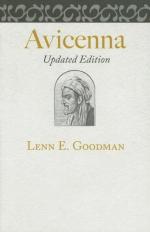|
This section contains 5,431 words (approx. 19 pages at 300 words per page) |

|
SOURCE: "Avicenna's 'Flying Man' in Context," in The Monist, Vol. 69, No. 3, July, 1986, pp. 383-95.
In the essay below, Marmura discusses the three instances of Avicenna's "Flying Man" scenario, which illustrates Avicenna's philosophy of mind.
The psychological writings of the Islamic philosopher Avicenna (Ibn Sīnā) (d. 1037) are noted for the hypothetical example he gives of the man suspended in space—the "Flying Man." This example, which left its impress on the Latin scholastics and has engaged the attention of modern scholars, occurs thrice in his writings in contexts that are closely related, but not identical. Its third occurrence, which represents a condensed version, conveys the general idea. It states, in effect, that if you imagine your "entity," "person," "self" (dhātaka) to be created at birth fully mature, sound in mind and body, but suspended in temperate air in such a manner that this "self" is totally unaware...
|
This section contains 5,431 words (approx. 19 pages at 300 words per page) |

|


